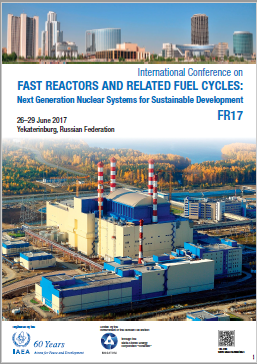Speaker
Dr
Konstantin Mikityuk
(Paul Scherrer Institute)
Description
An increasing number of countries are opting for new nuclear energy as an important step towards economic development and environmental protection. According to the IAEA, electricity from nuclear energy may triple by 2050 as evidenced in the report IAEA-RDS-1/33; therefore, the projected use of this carbon-free technology will require many new nuclear engineers and scientists. In addition, countries such as France, the United States, which are the world’s largest producers of nuclear energy, are experiencing a decline in the nuclear energy workforce both in their national laboratories and in the private sector. The future vigor and prosperity of nuclear energy and associated nuclear science, clearly depend on continued use of available nuclear reactors as well as the development of advanced nuclear reactor technologies. To maintain the know-how in this field, to increase the knowledge of new advanced concepts, and to avoid the loss of the knowledge and competences that could seriously and adversely affect the future of nuclear energy, the Generation IV International Forum (GIF) established the GIF Education and Training Task Force. The task force serves as a platform to enhance open education and training as well as communication and networking in support to GIF. Indeed, its first initiative is the organization of a webinar series on the next generation of nuclear energy systems (Sodium Fast Reactor, Supercritical Water Reactor, Molten Salt Reactor, Lead Fast Reactor, Very High Temperature Reactor, and Gas-cooled Fast Reactor) and other cross-cutting subjects such as the basics on nuclear reactor systems, thorium fuel cycle, and nuclear fuel and materials.
By exploiting modern internet technologies, the GIF Education and Training Task Force is reaching out to a broad audience and is raising the interest and strengthening the knowledge of participants in topics related to advanced reactor systems and advanced nuclear fuel cycles.
This achievement is the direct result of partnering with internationally recognized subject matter experts and leading scientists in the nuclear energy arena who conduct live webinars on a monthly basis (for more details on the webinar series please see https://www.gen-4.org/).
Besides opening the classroom to everyone in the world, the webinars offer earlier opportunities for interdisciplinary networking and educational and research collaboration. The details and examples of the GIF webinar modules will be presented in our paper.
Country/Int. Organization
USA/Department of Energy
Author
Dr
Patricia PAVIET
(Department of Energy)
Co-authors
Dr
Claude RENAULT
(Commissariat a l'Energie Atomique et aux Energies Appliquees)
Dr
Concetta Fazio
(joint Research Center)
Dr
Grace PYNN
(Natural Resouces Canada)
Prof.
Il Soon Hwang
(Seoul National University)
Dr
John Kelly
(U.S. Department of Energy)
Prof.
Jun SUN
(Tsinghua University)
Dr
Konstantin Mikityuk
(Paul Scherrer Institute)
Prof.
Massimiliano Fratoni
(University of California, Berkeley)
Dr
Nolitah MPOZA
(Deparment of Energy)
Dr
Takatsugu Mihara
(Japan Atomic Energy Agency)
Prof.
Xiaojing Liu
(Shanghai Jiao Tong University)
Dr
Youngmi Nam
(Korea Atomic Energy Research Institute)
Dr
pavel ALEKSEEV
(Russian Research Center "Kurchatov Institute")

